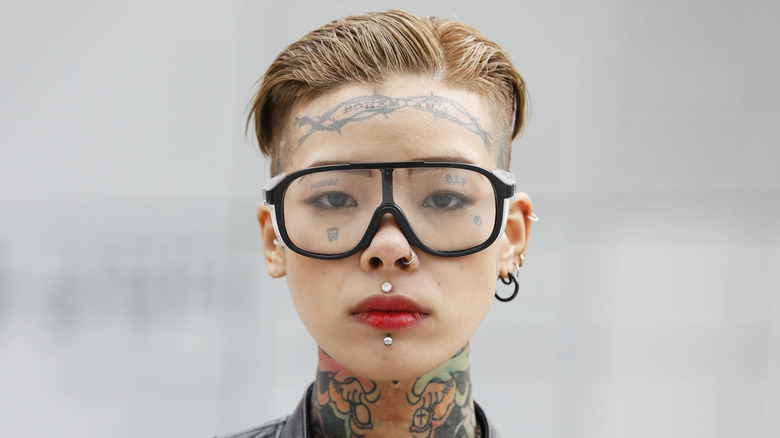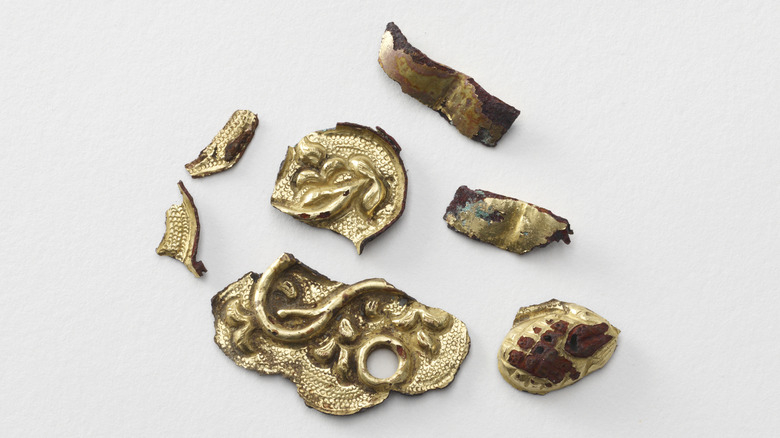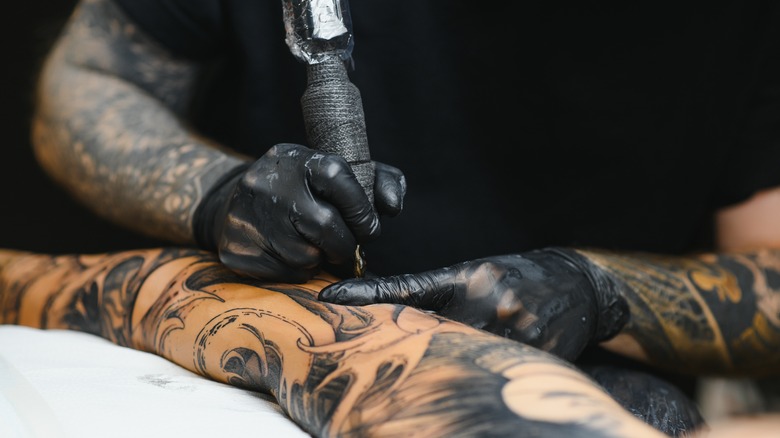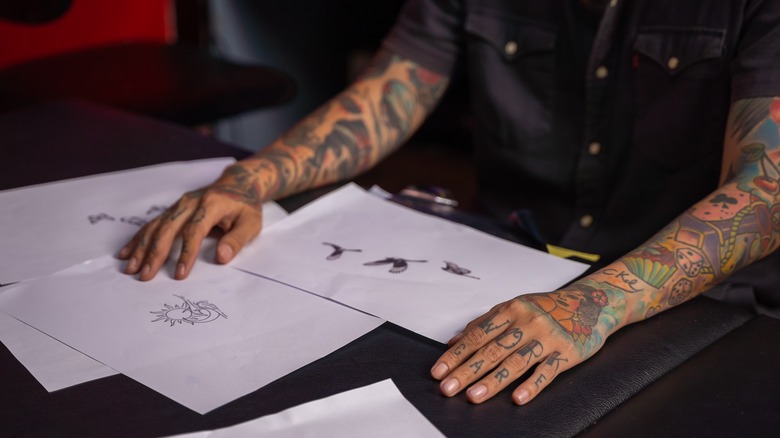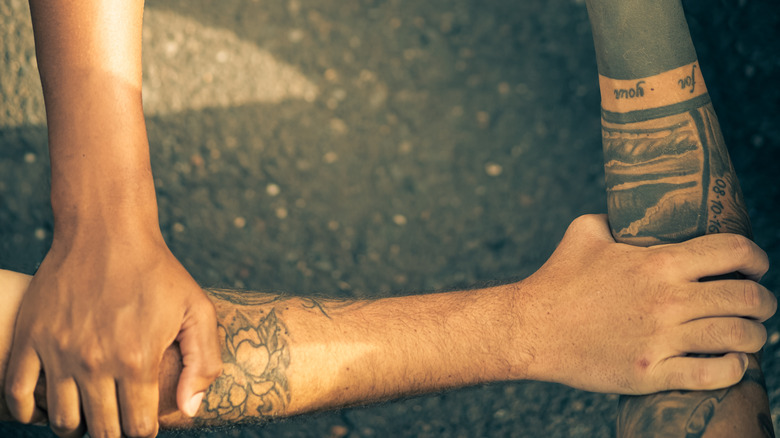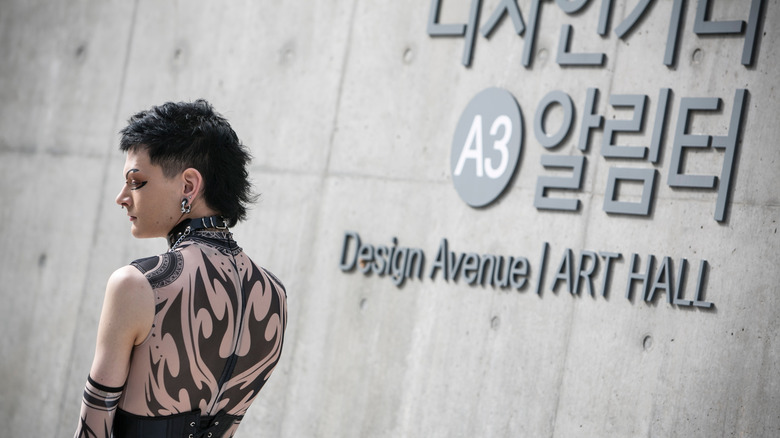Why Tattoos Are Illegal In South Korea
There is a strange history of tattoos. The first tattoo is thought to have been given 5,200 years ago to a frozen corpse discovered with inked markings on its body, according to Smithsonian Magazine. Afterward, tattoos popped up in history on the bodies of Egyptians, and historians believe they were administered with sharpened bronze instruments on women only. Since then, tattoos have been used as a form of punishment, protection, and, of course, style. Today, close to one-third of Americans have tattoos, and that number is increasing (via Ipsos).
The U.S. has its own history of strange legislation, like the so-called "ugly laws" of the 1970s and the time when dancing was once illegal. In South Korea, it's tattoos that are illegal, although that hasn't stopped a budding industry from growing underground, sprawled out in empty office spaces across the country.
The history of munshin
Tattoos, which are also called "munshin" in South Korea, used to be administered to criminals and enslaved people back in the Koryo dynasty founded in the year 918 (via The New York Times). The practice was a way to ostracize people and wasn't outlawed until 1740. Later, these negative connotations persisted in South Korean culture, as — like in many other parts of the world — tattoos became synonymous with gang culture.
Today in South Korea, tattoos are still blurred out on television if actors or performers do not cover them up with long sleeves (via BBC News). In the 1990s, the South Korean government took the criminalization of tattoos a step further and officially restricted the practice to something that could only be performed by medical doctors, according to BBC News. Similarly, in Japan, people with tattoos were historically ostracized, but in 2020, the Japanese Supreme Court removed the requirement that only medical doctors give tattoos (per The New York Times).
What's at stake
In March of this year, South Korea's government rejected a similar appeal to remove the tattoo ban, leaving them restricted to something only a medical professional would perform, according to Reuters. The government's ruling was based on the risk of infection accompanying the tattoo procedure. According to the outlet, the court ruling stated, "The limited medical knowledge and skills involved in tattooing cannot ensure the levels of treatment that medical professionals can provide," despite the millions of tattoos that have been performed worldwide by non-doctors.
Although there are a few doctors who have pivoted from the medical field to start tattooing in South Korea, the vast majority of tattooers there are artists, and they are growing in number (via BBC News). Per Reuters, almost 50,000 artists are working across the country underground, with 50 million won (or about $41,300) and a prison sentence of between two years and a lifetime at stake. Because their trade is illegal, tattoo artists lack the work protections and safety inherent to other jobs (via The New York Times). If something happens between the artist and their client, they can't go to the police because their trade is illegal. According to BBC News, some live in constant fear that their competition or clients will out them to the police.
The tattoo underground
Although the government does not "actively track down tattoo studios," tattoo artists still have to use strategies to keep their work relatively hidden, per BBC News. According to The New York Times, some artists rent out the upper floors of buildings or move around every couple of years to keep their location elusive. There is typically no signage on their studios.
Instead, like in many other parts of the world, people find the artists on social media. Many South Korean tattoo artists have gained hundreds of thousands of followers online for their work. "K-tattoos" are characterized by a fine precision to detail, colorful watercolors, and other trademarks that have become popular and sought after not just in South Korea but all over the world (via The New York Times). Korean celebrities like Jungkook, Lee Hyori, and Zico have tattoos, showing them off on social media and likely inspiring the next generation to get more (via Creatrip).
Building a union
To protest the government's unwillingness to recognize the tattoo industry, at least 650 tattoo artists have formed a labor union to fight for their rights, according to The New York Times. Mr. Kim, who started the union, told BBC News that he started the union because he wanted his "fellow tattooists to work in a safe environment" and that "the tattooed people in Korea have rights to their bodies." Some other 3,000 tattoo artists have bound together in the Korea Tattoo Association to protect their rights as artists.
Across the country, many artists and their clients think the ruling is outdated and that it stands apart from most of the rest of the world. More than half of respondents to a 2021 Gallup poll said they wanted to legalize tattoos in their country, although more of the younger generations tended to favor legislation than the older generations surveyed.
Moving elsewhere
According to Mr. Kim's interview with BBC News, many tattoo artists are leaving South Korea so that they don't have to work underground anymore. Indeed, studios in the U.S. recruit talent from South Korea for their popular style. Meanwhile, in South Korea, artists are still going to court for doing their jobs. In 2019, one artist was fined 3 million won (or about $2,500), according to the Yonhap News Agency. Just this year, a similar case occurred with another artist that was charged the same amount, according to Money S.
Those that stay in South Korea have clients coming to them. According to Insider, one "Singaporean beauty marketing manager Teresa Chan ... has flown to Seoul on three separate occasions to get inked by three different artists." The irony of having growing global fame while being forced underground in their home country is not lost on one tattoo artist named Sol. She told Insider, "We may be known worldwide thanks to social media, but the reality is that our businesses cannot be proudly open."
